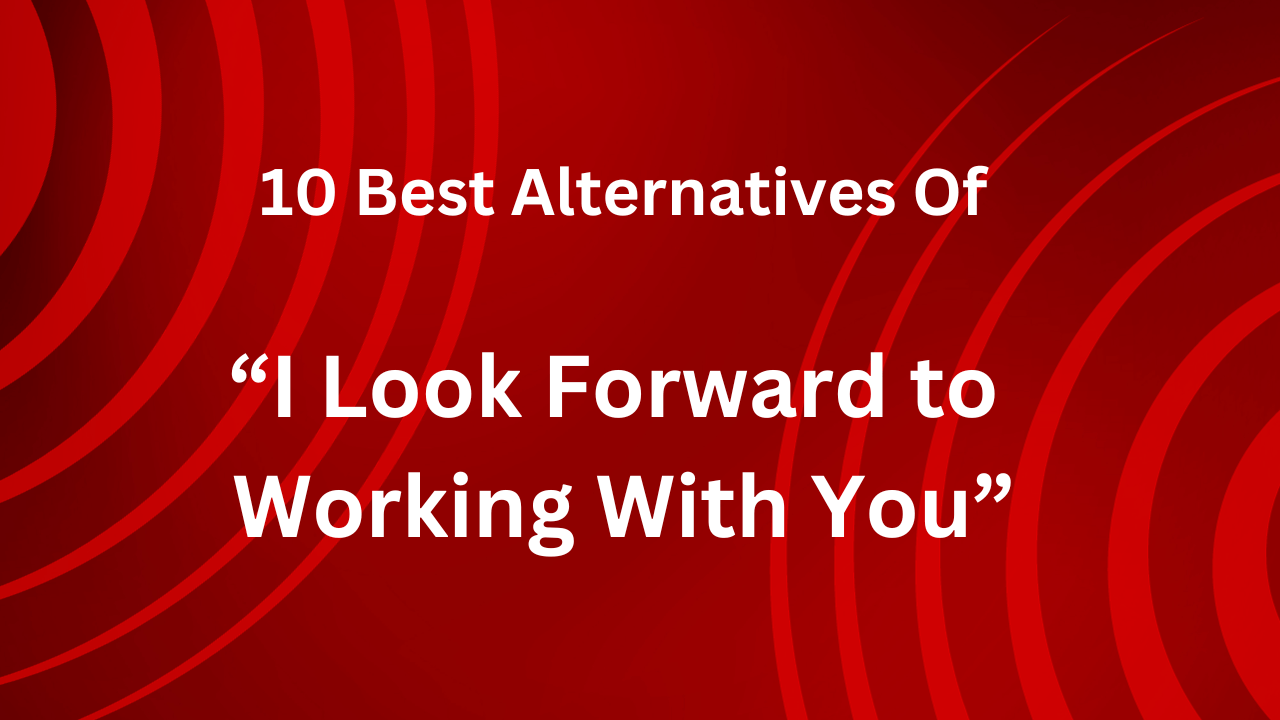If you’re seeking assistance or a response from someone you know is pressed for time, navigating the delicate balance of expressing understanding without sounding demanding or desperate can be crucial.
In your pursuit of finding the right way to convey ‘I understand that you are busy’ in an email with professionalism, you’ve found the right resource.
This article aims to provide valuable insights by offering a selection of refined synonyms, guiding you on how to express your awareness of their busy schedule in a manner that is both respectful and professional.
Is It Polite to Say “I Understand That You Are Busy”?

Expressing acknowledgment of someone’s busy schedule through the phrase “I understand that you are busy” is a courteous way to convey respect for their time, particularly when requesting their assistance or engagement.
Primarily, this phrase is well-suited for formal communication, making it appropriate for situations such as reaching out to someone after a period of silence. When seeking support or collaboration, incorporating this phrase communicates an awareness of their demanding schedule while expressing your need for their valuable assistance.
To illustrate how this can be applied effectively, consider the following email sample:
Subject: Assistance Needed for Assignment
Dear Dr. Jones,
I trust this message finds you well amidst your busy schedule. I am reaching out to seek your expertise and guidance on an upcoming assignment. I understand that you are busy, but your assistance would be greatly appreciated whenever you find a moment to spare.
Thank you for your time and consideration.
Best regards,
Joanna Pickett
Pros:
Conveys formality and respect.
Demonstrates appreciation for the recipient’s busy schedule, especially when seeking assistance.
Cons:
May come across as slightly forced and, in certain contexts, passive-aggressive.
The phrase itself is somewhat generic.
While “I understand that you are busy” remains a suitable choice for formal emails, it’s essential to explore alternative expressions to add variety and nuance to your communication. The following sections will introduce some of the best alternatives, providing you with a range of options to articulate your consideration for someone’s busy schedule.
What to Say Instead of “I Understand That You Are Busy”

- I’m cognizant of the demands on your time.
- I acknowledge the busyness you navigate daily.
- I understand you have a demanding schedule.
- I’m mindful of the time constraints you face.
- I recognize the challenges posed by your packed agenda.
- I appreciate your time is highly sought after.
- I’m aware that your calendar is often filled.
- I acknowledge the time pressures you’re currently managing.
- I understand you’re juggling numerous responsibilities.
- I’m cognizant of the demands placed on your schedule.
- I’m mindful of the demands vying for your attention and time.
I’m cognizant of the demands on your time.
Recognizing the demands on someone’s time is a courteous way to acknowledge their busy schedule. This phrase conveys a deep understanding of the challenges they face in managing various responsibilities. By using “cognizant,” it emphasizes a heightened awareness, ensuring the recipient feels understood and valued. Isn’t this better than “I Understand That You Are Busy”.
Sub: Request for Collaboration Amidst Your Busy Schedule
Devon
I hope this message finds you well. As I reach out to discuss a potential collaboration, I’m cognizant of the demands on your time. Your expertise is highly valued, and I understand the challenges your schedule may pose.
I am eager to explore ways in which we can work together effectively. Could we schedule a brief meeting at your convenience to discuss this opportunity further?
Your consideration is greatly appreciated, and I look forward to the possibility of collaborating with you.
Best regards,Devon
I acknowledge the busyness you navigate daily.
This expression goes beyond a simple recognition of busyness; it acknowledges the daily navigation through a busy schedule. It communicates an understanding of the ongoing nature of their busy routine. Using “navigate” adds a dynamic element, portraying their schedule as a journey that requires skill and effort. Isn’t this better than “I Understand That You Are Busy”.
Sub: Acknowledgment of Your Daily Commitments
Dear John,
I trust this email finds you in good spirits. Recognizing the busyness you navigate daily, I am writing to express my appreciation for your ongoing commitments.
Your dedication to your responsibilities is truly commendable. Despite your hectic schedule, I believe your insights would greatly benefit [specific project]. Could we arrange a convenient time to discuss this further?
Thank you for your time and commitment.
Warm regards,
Devon
I understand you have a demanding schedule.
Direct and to the point, this phrase communicates empathy for the challenges posed by a demanding schedule. It conveys a clear comprehension of the workload and time constraints faced by the individual. The simplicity of the expression ensures clarity and sincerity in your acknowledgment. Isn’t this better than “I Understand That You Are Busy”.
Sub: Seeking Your Expertise Despite Your Demanding Schedule
Dear John,
I hope this message reaches you well. Acknowledging that you have a demanding schedule, I am reaching out to seek your expertise on Your topic.
I believe your insights would significantly contribute to our ongoing efforts. Whenever your schedule allows, could we arrange a meeting or a call to discuss this matter further?
Thank you for considering this request. I appreciate your time and expertise.
Best regards,
Devon
I’m mindful of the time constraints you face.
This phrase emphasizes mindfulness, suggesting a thoughtful and considerate approach. By addressing the specific aspect of time constraints, it shows awareness of the limitations on their schedule. This expression is ideal for conveying empathy and understanding without sounding intrusive. Isn’t this better than “I Understand That You Are Busy”.
Sub: Request for Your Time Amidst Constraints
Dear John,
I trust you’re managing well. In reaching out, I want to express that I’m mindful of the time constraints you face.
Understanding the demands on your schedule, I believe your guidance on Your topic would be invaluable. Could we schedule a time for a brief discussion when it suits you?
Your time is greatly appreciated, and I look forward to our conversation.
Kind regards,
Devon
I recognize the challenges posed by your packed agenda.
Acknowledging the challenges of a packed agenda demonstrates an understanding of the difficulties associated with managing numerous tasks. “Recognize” adds a layer of validation, affirming the legitimacy of their busy schedule. This expression is suitable for situations where a formal tone is essential. Isn’t this better than “I Understand That You Are Busy”.
Sub: Recognition of Your Packed Agenda
Dear John,
I hope this email finds you well amidst your packed agenda. I want to express my recognition of the challenges posed by your busy schedule.
Despite your commitments, I believe your insights would be instrumental in addressing Specific Project. Could we arrange a meeting at your earliest convenience to discuss this further?
Your consideration is highly valued, and I appreciate your time.
Best regards,
Devon
I appreciate your time is highly sought after.
By combining gratitude with acknowledgment, this approach fosters a positive and respectful tone, making it a more effective and gracious alternative to the common phrase, “I understand that you are busy.”
Recognizing and valuing someone’s time not only shows appreciation but also builds a stronger, more respectful connection. It reflects a genuine understanding of their busy schedule and highlights the importance you place on their time. This thoughtful expression can leave a lasting positive impression, demonstrating both respect and gratitude.
Sub: Acknowledgment of Your Sought-After Time
Dear John,
I trust this email finds you in good health. Acknowledging that your time is highly sought after, I want to express my appreciation for your contributions in various capacities.
Understanding the demands on your schedule, I believe your insights on Any matter would be invaluable. Could we schedule a meeting or call at your earliest convenience?
Thank you for considering this request. Your time and expertise are truly appreciated.
Warm regards,
Devon
I’m aware that your calendar is often filled.
Addressing the frequently filled calendar reflects an understanding of consistent busyness. This expression conveys a sense of reliability and predictability in their schedule, indicating that their time is consistently occupied. It’s a straightforward way to acknowledge their ongoing commitments. Isn’t this better than “I Understand That You Are Busy”.
Sub: Scheduling Amidst Your Full Calendar
Dear John,
I hope this message finds you well. I’m aware that your calendar is often filled, and I appreciate your ongoing commitments.
Despite your busy schedule, I believe your involvement in Any task would greatly enhance its success. Could we coordinate a time for a brief discussion when it suits you?
Your time and expertise are highly valued. Thank you for considering this request.
Best regards,
Devon
I acknowledge the time pressures you’re currently managing.
This phrase explicitly acknowledges the immediate time pressures the individual is facing. By incorporating “currently,” it conveys a real-time awareness of their circumstances. It’s an excellent way to express empathy and understanding, especially in situations where time sensitivity is crucial. This approach is more engaging and considerate than simply saying, “I understand that you are busy.”
Sub: Request for Your Insights Amidst Time Pressures
Dear John,
I trust you’re managing well amidst your responsibilities. Acknowledging the time pressures you’re currently managing, I am reaching out to seek your insights on any project.
Understanding the demands on your schedule, could we schedule a brief discussion at your convenience?
Thank you for considering this request. Your time and expertise are greatly appreciated.
Warm regards,
Devon
I understand you’re juggling numerous responsibilities.
Describing their situation as “juggling numerous responsibilities” paints a vivid picture of the multitasking nature of their schedule. This expression conveys the complexity and balance required to manage various tasks, making it a relatable and empathetic way to acknowledge their workload. It’s a more engaging and thoughtful alternative to simply saying, “I understand that you are busy.”
Sub: Request for Collaboration Amidst Your Responsibilities
Dear John,
I hope this email finds you in good health. I understand you’re juggling numerous responsibilities, and I appreciate your dedication.
Despite your busy schedule, I believe your involvement in any task would be invaluable. Could we schedule a meeting or call to discuss this further?
Thank you for considering this request. Your time and expertise are highly valued.
Best regards,
Devon
I’m cognizant of the demands placed on your schedule.
By expressing cognizance of the demands on someone’s schedule, this phrase communicates a keen awareness of the challenges they face. The use of “placed on” highlights the external pressures impacting their time, underscoring empathy and understanding. This nuanced approach is far more engaging and considerate than simply saying, “I understand that you are busy.
Sub: Acknowledgment of Your Schedule Demands
Dear John,
I trust this message finds you well. I’m cognizant of the demands placed on your schedule, and I appreciate your dedication to your commitments.
Understanding your busy agenda, I believe your insights on any task would be highly beneficial. Could we schedule a meeting or call when it suits you?
Your time and expertise are truly valued. Thank you for considering this request.
Warm regards,
Devon
I’m mindful of the demands vying for your attention and time.
The use of “mindful” suggests a thoughtful and considerate approach to acknowledging their busy schedule. This phrase goes beyond recognizing mere busyness, emphasizing the competition for their attention and time. It conveys a deep understanding of the various demands they must contend with. This approach is more empathetic and engaging than simply saying, “I understand that you are busy.”
Sub: Request for Your Time Amidst Various Demands
Dear John,
I hope this message reaches you in good health. I’m mindful of the demands vying for your attention and time, and I appreciate your dedication.
Understanding your busy schedule, I believe your input on Any project would be instrumental. Could we schedule a meeting or call to discuss this further?
Your time and expertise are highly valued. Thank you for considering this request.
Best regards,
Devon
Conclusion:
In conclusion, effective communication requires a delicate balance of expressing one’s needs while respecting the constraints of others. The phrases offered provide a nuanced approach to convey understanding and consideration for someone’s busy schedule.
Whether acknowledging their daily commitments, recognizing the challenges of a packed agenda, or expressing gratitude for their sought-after time, these expressions contribute to building positive and respectful communication.
It is crucial to remember that while “I understand that you are busy” serves as a versatile and polite choice, exploring alternatives can add depth and sincerity to your communication.
By incorporating these phrases into your emails, you not only demonstrate empathy but also enhance the overall quality of your interactions.
In various professional contexts, expressing awareness of someone’s busy schedule fosters an atmosphere of collaboration and mutual understanding.
Whether seeking collaboration, acknowledging commitments, or requesting assistance, choosing the right phrase demonstrates a high level of emotional intelligence and contributes to positive relationships.
Read this post: 11 Synonyms for “Step Out of Your Comfort Zone”
As you navigate through diverse communication scenarios, feel free to tailor these expressions to suit the specific context and relationship dynamics.
Utilizing a variety of phrases ensures a genuine and respectful tone in your communication, allowing you to connect more effectively with others.
Remember, effective communication is a continuous process of refinement and adaptation. So, as you strive for clear, respectful, and considerate expression, these phrases stand ready to enhance your communication toolkit.
“I understand that you are busy” may be the foundation, but the versatility of language offers an array of options to articulate your understanding and appreciation.
In your pursuit of effective communication, may these phrases serve as valuable tools, allowing you to navigate professional interactions with grace and consideration.
“I understand that you are busy,” and I appreciate your time and attention to this exploration of respectful communication. “I understand that you are busy,” and I trust these phrases will enrich your communication repertoire.










